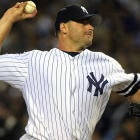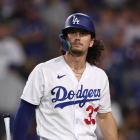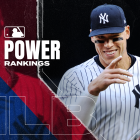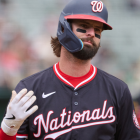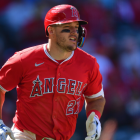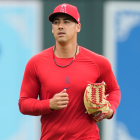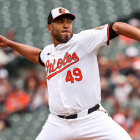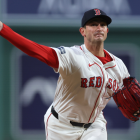
Five Hall of Fame voting cycles ago, I ran through how much an entire generation of starting pitchers are getting jobbed in the vote and very little has changed. Mike Mussina has gotten in, though, which means we can take a look at the somewhat updated outlook. Here are the number of Hall of Fame starting pitchers from selected "generations," based upon the year in which the pitcher debuted in the majors:
- 1871-91: 13
- 1897-16: 21
- 1918-39: 11
- 1923-39: 11
- 1950-67: 15
- 1986-2004: 7
It's an issue I bring up during every single Hall of Fame voting cycle because it's a shame to see the Hall getting "watered down." Here's another point of contention: It's actually gotten tougher to get into the Hall of Fame. Notably, thanks in part to the ridiculous offensive numbers we saw in the so-called "Steroid Era," starting pitchers have been getting the shaft.
At some point in the near future, there needs to be a shift in the perspective of voters or it's only going to get worse. Take the way the game is played nowadays with the starting pitcher throwing fewer and fewer innings. Sure, the strikeout totals are higher than ever on a rate basis, but with fewer innings and more specialization, the formerly-almighty win takes on much less significance (many, such as myself, would call this a victory anyway, because the pitcher win is an incredibly dumb stat when used as a primary indicator). For example, Jacob deGrom has 70 career wins. The Hall of Fame starter with the lowest number of career wins is Candy Cummings with 145. Dizzy Dean has 150. Addie Joss 160 and then Sandy Koufax 165. I'm only prepared to say Koufax of that group is going to have a better Hall of Fame case than deGrom, once the dust has settled, but deGrom isn't catching any of them in wins.
If we want the example of a retired pitcher who got jobbed, how about Johan Santana? The two-time Cy Young winner was broadly considered either the best pitcher in baseball or one of the top two or three for five seasons. He won three ERA titles. He led the league in strikeouts three times and WHIP four times. In those five glorious seasons, Santana was 86-39 with a 2.82 ERA (157 ERA+), 1.02 WHIP and averaged 238 strikeouts against 52 walks in 229 innings per season. ERA+ adjusts for ballpark and era and Santana's 136 career mark is tied for 21st all-time with Christy Mathewson and Bruce Sutter. He's ahead of Pete Alexander, Randy Johnson, Whitey Ford, Greg Maddux, Sandy Koufax and a litany of other all-time greats. Santana got 2.4 percent of the vote in 2018 in his only try on the ballot.
Why? Well, Santana only played 12 years. Of course, Koufax only played 12 years. Santana only won 139 games in an era when starters take the ball far fewer times per season and don't stay in the game nearly as long. It cost him.
I'm of the mind that we judge players for the Hall of Fame against their peers just as much as we're judging against history. When we say Babe Ruth is arguably the greatest player of all time, it isn't surmising that we could grab him in a time machine and throw him into today's game. He'd be, um, let's just say "fighting a tough battle," for myriad reasons -- but he's a titan of the game because of how much better he was than his peers.
As such, we shouldn't lament the role of the starting pitcher and punish modern pitchers for not racking up 300-plus innings per season. They are playing a different game than Walter Johnson was. We should be judging the pitchers against their peers. So let's do that with the current starting pitchers on the Hall ballot and I'll offer a quick verdict.
Roger Clemens
Not much more really needs to be said on Rocket. His statistical line reads as possibly the single greatest pitcher in baseball history. There isn't much arguing to be done. Either the PED ties disqualify him for you or you think he should be in.
Verdict: Yes, my rule is if a player was suspended under MLB's Joint Drug Agreement he's a no, but anyone who wasn't is judged solely on how they played the game.
Curt Schilling
Schilling reached 70 percent of the vote last season and there's a reasonable chance he hits the needed 75 percent this time around to get in. His pitching resume says he should. He went 216-146 with a 3.46 ERA (127 ERA+), 1.14 WHIP and topped 3,000 K (3,116). He led the league in wins twice, complete games four times, innings twice, strikeouts twice, WHIP twice and strikeout-to-walk rate five times. He never won a Cy Young, but finished second three times. He sits 26th in career WAR for pitchers, trailing only Hall of Famers and Clemens. There are 65 Hall of Fame starting pitchers, so he's above average. He's above the standard in JAWS, too, which has him ahead of Mike Mussina, Tom Glavine, Nolan Ryan, Justin Verlander, Clayton Kershaw, Jim Palmer, Bob Feller and Roy Halladay, among others.
None of this includes postseason stats, where Schilling was one of the best ever. In 19 starts, he was 11-2 with a 2.23 ERA, 0.97 WHIP and 120 strikeouts against 25 strikeouts in 133 1/3 innings. This includes four complete games, two shutouts, an NLCS MVP and World Series MVP. Let's not leave out the three rings.
Much discussion on Schilling these days centers around his personality and I have no issue with that. I'll simply say that his pitching resume vs. his 38.8 percent of the vote in 2013 -- before he'd really made many high-profile waves -- never, ever made any kind of sense. That's where there's a separation in judging starting pitchers for the Hall of Fame these days.
Verdict: Yes, judging the on-field play only.
Andy Pettitte
Here's an interesting case, because Pettitte is much closer to having an old-school case than new-school. He has 256 career wins and over 3,000 innings. He topped 200 innings 10 times. He was in the rotation for five World Series championship teams. He went 19-11 in the postseason. He won an ALCS MVP. I kind of feel like we could stop right here, throw this same resume in the 1940s-50s and he'd be in the Hall of Fame.
Was he dominant, though? Pettitte only went to three All-Star games in 18 seasons. He did finish second in Cy Young voting once and got votes four other times, but he was mostly a compiler. Oh, and in an era with strikeouts increasing, he didn't do that much. He ended with 2,448 in 3,316 innings, only finishing in the top 10 of his league four times (and never in the top five).
He sits 91st in JAWS and 63rd in WAR, which makes sense, as JAWS is a hybrid that figures in a player's peak. Pettitte was a long-time compiler who never had a dominant peak. He had a great career, just not a Hall of Fame one.
Verdict: No, though he's close as a compiler.
Tim Hudson
It probably shouldn't happen, but we're all human and it happens: One moment I'll never forget was being in the Giants clubhouse after they won the 2014 World Series in Kansas City. Seeing Tim Hudson win his first ring -- at age 38 in his 16th MLB season after being bounced from the playoffs six previous times -- and his reactions throughout the night was pretty fun.
He won 222 games (the .625 winning percentage is 66th in MLB history) and pitched to a 3.49 ERA (120 ERA+) in his 17 seasons. He was a four-time All-Star and got Cy Young votes four times, topping out at a runner-up finish in 2000. He had eight 200-inning seasons and seven times finished in the top 10 in his league in pitcher WAR. The three most statistical similar pitchers to him on baseball-reference.com are Kevin Brown, Bob Welch and Orel Hershiser.
Verdict: Congrats on a very long and great career, but no.
Mark Buehrle
Buehrle debuted in 2000 to pitch 51 1/3 innings, mostly in relief. He'd then string together 14 consecutive years of 200-plus innings before just missing with 198 2/3 in his final season. He was a five-time All-Star and four-time Gold Glover (and, frankly, probably should have won more of those; he was magnificent). He won 214 games with 33 complete games and 10 shutouts, including his two no-hitters (one was perfect). He won a World Series ring with the 2005 White Sox, a team wholly underappreciated for what they did. He had an incredibly admirable career.
Verdict: Congrats on a very long and great career, but no.
Barry Zito
The 2002 Cy Young winner, Zito was the proprietor of an aesthetically-gorgeous, slow, old-school curve. The three-time All-Star racked up at least 213 innings his six full seasons with the A's before hopping across the Bay where he was never quite the same (though advanced metrics showed it was pretty predictable). Still, he outpitched Justin Verlander in Game 1 of the 2012 World Series and won a ring.
Verdict: I really liked that curve.
Dan Haren
A three-time All-Star -- he started the game once -- who got Cy Young votes twice, Haren won 153 games in his 13-year career. He once had a string of seven straight 200-inning seasons. He led the majors in WHIP in 2009 and twice finished in the top 10 in pitcher WAR.
Verdict: His twitter handle is "ithrow88," which is outstanding, self-deprecating humor.
A.J. Burnett
Burnett won 164 games in his 17-year career. He led the league in strikeouts in 2008 for the Blue Jays and then was an important part of the 2009 Yankees World Series title. Fun tidbit: He made one All-Star team and it was in his final season, at age 38.
Verdict: HE THREW A NO-HITTER WITH NINE WALKS, A HIT BATSMAN, A WILD PITCH AND THREE STOLEN BASES ALLOWED!
I complained and I'd only add two guys? What gives? Well, first off, I'd go back and add Johan Santana and probably Kevin Brown. CC Sabathia (debuted in 2001) will also be a future consideration, as will Zack Greinke (2004). Just these four with Clemens and Schilling would make things a lot more balanced for this generation. Next generation will get the likes of Verlander, Max Scherzer and Clayton Kershaw just off the top, too. Let's just all stop focusing so much on individual "wins" in a team sport, please?













